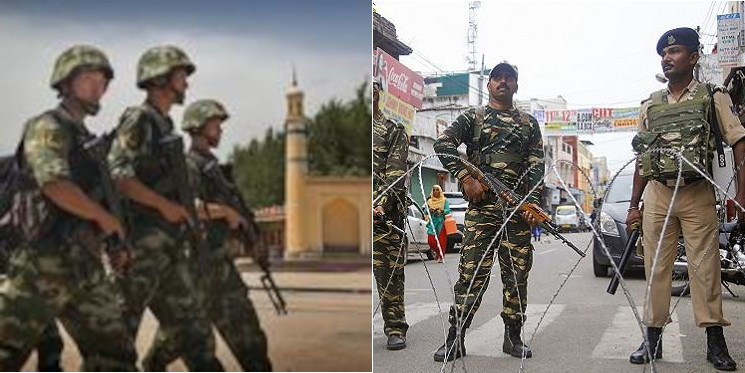The scale of the attacks is incredible: the Taj, the Oberoi Trident, a major train station (CST), a major hospital (Cama), a cafe that’s favoured by tourists (Cafe Leopold), the Jewish centre, all in different parts of the city. Some attackers came by sea, others set off bombs, others just entered buildings or public areas and started shooting. The people of India’s cities, like Pakistan’s and many others, have suffered many bombings in recent months and years. There have also been major raids against targets in India, like the December 2001 attack on the Indian parliament in New Delhi. But so many simultaneous attacks on so many different parts of the city, with gunmen taking hostages in some places, setting off bombs in others, settling in to fight commandos for days in others, is something new, and terrifying. The death toll is already well over 100, and will probably be higher before the end.
The military sophistication is matched by political incomprehensibility. Very little that is credible is known about who the attackers are and what their motivations could be. This will continue to be the case for some time, and it is still the case for many of the attacks and bombings of civilians that have occurred in India in recent years. But if the “Deccan Mujahadeen” whose emails have been released to the public are a real group and are responsible, they will not win themselves any political points with India’s Muslims, who are moving in the opposite direction. Delhi-based commentator (and friend of mine) Badri Raina earlier this week contrasted the changes happening in the Indian Muslim community with the posture of India’s Hindu chauvinists in the Sangh Parivar:
“A remarkable dynamic counter to the re-centralizing, purity-oriented turmoil within the Sangh Parivar is currently at work among India’s Muslims. A dynamic that I venture bears the promise of defeating the renewed fascistic call of the Parivar more conclusively than anything else in view.”
That dynamic, Raina says, has two parts. On the one hand, a questioning of “social practices supposedly ordained by one clerical authority or the other”, a “condemning the killing of innocents especially as un-Islamic”, and on the other, the participation of Muslims “increasingly and in great numbers” in “civil rights activities that seek… to reinforce the non-discriminatory exercise of the rule of law.”
While India’s Muslims may be trying to move in one direction, what follows this attack could be dangerous for that community. After the February 2002 Gujarat pogroms and Godhra massacre, Arundhati Roy wrote about what could happen to India’s Muslims:
“Under this relentless pressure, what will most likely happen is that the majority of the Muslim community will resign itself to living in ghettos as second-class citizens, in constant fear, with no civil rights and no recourse to justice. What will daily life be like for them? Any little thing, an altercation in a cinema queue or a fracas at a traffic light, could turn lethal. So they will learn to keep very quiet, to accept their lot, to creep around the edges of the society in which they live. Their fear will transmit itself to other minorities. Many, particularly the young, will probably turn to militancy. They will do terrible things. Civil society will be called upon to condemn them.”
During those Gujarat massacres of 2002, people resisted the police and the mobs that were doing the killing. In 2004, the BJP were out of power nationally because people did not vote on chauvinist lines. Some citizens of Mumbai have already said that they will stay together and not allow these attacks to destroy their community. The political forces that will seek to benefit from this are those who want violence between India and Pakistan and between Hindus and Muslims in India. The trap these forces have set will fail if these attacks fail to derail the positive movement in South Asia for detente between India and Pakistan, and fail to strengthen communalism in India. That Pakistan is publicly cooperating with India will help, as will the fact that the BJP is not in power today.

